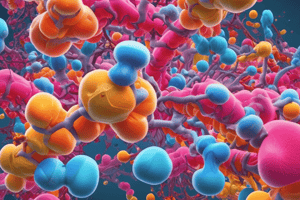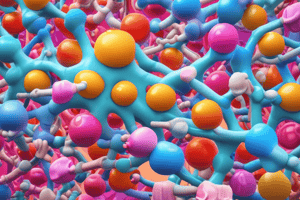Podcast
Questions and Answers
Liver glycogen is used in fasting to provide
glucose for use by other tissues including the brain.
Muscle glycogen is not. What is the explanation for
this?
Liver glycogen is used in fasting to provide glucose for use by other tissues including the brain. Muscle glycogen is not. What is the explanation for this?
- A) Muscle does not have a debranching enzyme.
- B) Muscle cannot degrade glycogen further than glucose-1-phosphate
- C) Muscle lacks glucose-6-phosphatase. (correct)
- D) The liver provides all the glucose necessary for metabolism and there is no need for muscle to do the same.
Which of the following is NOT a function of glucagon?
Which of the following is NOT a function of glucagon?
- Raising blood glucose levels
- Stimulating glycogen production from glucose
- C) Stimulating the release of glucose from the liver
- ) Increasing glucose production from fatty acid (correct)
) Which of pathway for glycogen breakdown in the
liver would prevent the cell from breaking down
glycogen in response to EPINEPHRINE
) Which of pathway for glycogen breakdown in the liver would prevent the cell from breaking down glycogen in response to EPINEPHRINE
- One that prevents it from hydrolyzing GTP
- . One that destroys its GTPase activity
- . One that prevents it from binding GTP
- One that causes it to constitutively (constantly) activate Phospholipase C (correct)
When glucose enters the beta cell, it is used to
produce ATP. The increase in ATP causes an influx of
a substance which causes the exocytosis of insulin.
What is this substance?
When glucose enters the beta cell, it is used to produce ATP. The increase in ATP causes an influx of a substance which causes the exocytosis of insulin. What is this substance?
Which of the following statements regarding glucose
is not true?
Which of the following statements regarding glucose is not true?
Which of the following statements regarding
glycogenolysis is not true?
Which of the following statements regarding glycogenolysis is not true?
. Which of the following statements is false about
gluconeogenesis?
. Which of the following statements is false about gluconeogenesis?
During gluconeogensis, the three irreversible steps of
glycolysis have to be bypassed. Final step is the conversion of
glucose-6-P to glucose that is catalyzed by glucose-6-
phosphatase. Which of the following statement is true about the
reaction step?
During gluconeogensis, the three irreversible steps of glycolysis have to be bypassed. Final step is the conversion of glucose-6-P to glucose that is catalyzed by glucose-6- phosphatase. Which of the following statement is true about the reaction step?
Which of the following Glucose
transporters is Insulin-dependent?
Which of the following Glucose transporters is Insulin-dependent?
Which of the following statements about
gluconeogenesis is correct?
Which of the following statements about gluconeogenesis is correct?
. In the glycogen synthase reaction, the precursor to glycogen is:
. In the glycogen synthase reaction, the precursor to glycogen is:
Which of the following statements is NOT true about the
synthesis of glycogen?
Which of the following statements is NOT true about the synthesis of glycogen?
Why is glycogen branching important?
Why is glycogen branching important?
A defect in branching enzyme
A defect in branching enzyme
which of the following enzymes is not an
irreversible enzyme in glycolysis or gluconeogenesis?
which of the following enzymes is not an irreversible enzyme in glycolysis or gluconeogenesis?
What are the main differences
between glycolysis and gluconeogenesis? Which one of the
statement is incorrect
What are the main differences between glycolysis and gluconeogenesis? Which one of the statement is incorrect
Q .What are the main differences between glycolysis and gluconeogenesis? Which of the
statement is correct?
Q .What are the main differences between glycolysis and gluconeogenesis? Which of the statement is correct?
Flashcards are hidden until you start studying




